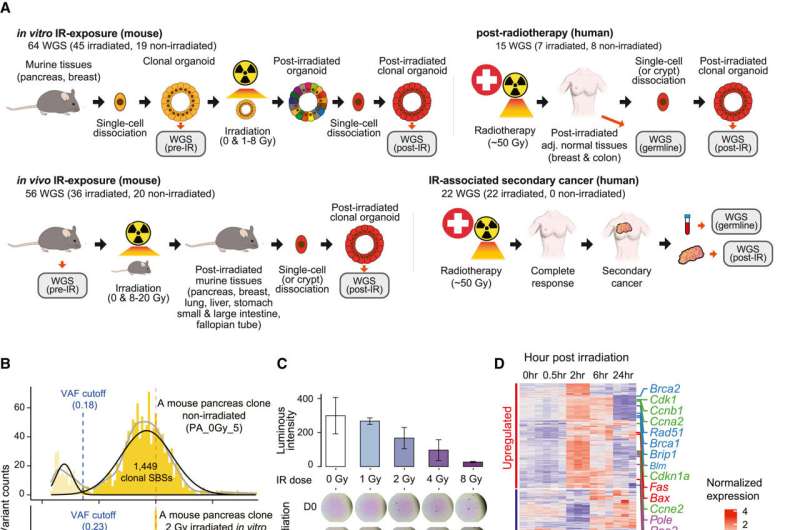This article has been reviewed according to Science X's editorial process and policies. Editors have highlighted the following attributes while ensuring the content's credibility:
fact-checked
peer-reviewed publication
trusted source
proofread
Genome sequencing unveils mutational impacts of radiation on mammalian cells

The recent release of the wastewater from Japan's Fukushima nuclear disaster stirred apprehension regarding the health implications of radiation exposure. Classified as a Group 1 carcinogen, ionizing radiation has long been associated with various cancers and genetic disorders, as evidenced by survivors and descendants of atomic bombings and the Chernobyl disaster.
Despite it being a much smaller amount, we remain consistently exposed to low levels of radiation in everyday life and medical procedures. Radiation, whether in the form of high-energy particles or electromagnetic waves, is conventionally known to break our cellular DNA, leading to cancer and genetic disorders. Yet, our understanding of the quantitative and qualitative mutational impacts of ionizing radiation has been incomplete.
Professor Young Seok Ju and his research team from KAIST addressed this topic. Their study, led by joint first authors Drs. Jeonghwan Youk, Hyun Woo Kwon, Eunji Kim, and Tae-Woo Kim, titled "Quantitative and qualitative mutational impact of ionizing radiation on normal cells," is published in Cell Genomics.
Employing meticulous techniques, the research team comprehensively analyzed the whole-genome sequences of cells pre- and post-radiation exposure, pinpointing radiation-induced DNA mutations. Experiments involving cells from different organs of humans and mice exposed to varying radiation doses revealed mutation patterns correlating with exposure levels.
Notably, exposure to 1 Gray (Gy) of radiation resulted in, on average, 14 mutations in every post-exposure cell. Unlike other carcinogens, radiation-induced mutations primarily comprised short base deletions and a set of structural variations, including inversions, translocations, and various complex genomic rearrangements.
Interestingly, experiments subjecting cells to low radiation dose rates over 100 days demonstrated that mutation quantities under equivalent total radiation doses mirrored those of high-dose exposure.
"Through this study, we have clearly elucidated the effects of radiation on cells at the molecular level," said Prof. Ju at KAIST. "Now we understand better how radiation changes the DNA of our cells," he added.
Dr. Son from the Dongnam Institute of Radiological and Medical Science stated, "Based on this study, we will continue to research the effects of very low and very high doses of radiation on the human body. We will advance the development of safe and effective radiation therapy techniques."
Professors Kim and Chang from Seoul National University College of Medicine said, "Through this study, we believe we now have a tool to accurately understand the impact of radiation on human DNA. We hope that many subsequent studies will emerge using the research methodologies employed in this study."
More information: Jeonghwan Youk et al, Quantitative and qualitative mutational impact of ionizing radiation on normal cells, Cell Genomics (2024). DOI: 10.1016/j.xgen.2024.100499. www.cell.com/cell-genomics/ful … 2666-979X(24)00026-0
Journal information: Cell Genomics





















